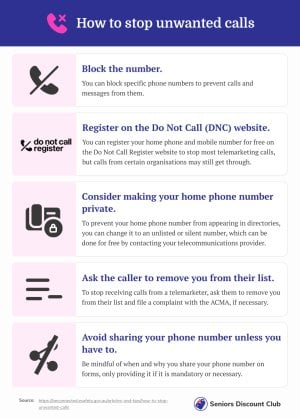Protect yourself: Here are three sneaky warning signs of online scams
- Replies 13
As much as we love the convenience and ease of use that the internet provides us, it has also become a breeding ground for scammers looking to take advantage of people by stealing their hard-earned cash - and we’re not just talking about tech-savvy Millennials, either.
As it turns out, older adults are among the biggest targets of cybercriminals, as they are perceived to be less familiar with the internet, making them the perfect target.
Sadly, new research conducted by the Australian Competition and Consumer Commission (ACCC) revealed that Australians alone lost a whopping $3.1 billion to scammers last year!
That's why we, the SDC team, are here to provide members with a bit of advice regarding how to spot the warning signs of a scammer before they can target you. If you know what to watch out for, you can easily stay away from the traps scammers set in order to steal your hard-earned money.

Here are three of the main warning signs to look for:
1. Urgency and fear-mongering
Scammers are known for creating a sense of urgency. A common tactic these criminals use is to move the conversation along quicker than you can think about it. They may even use fear-mongering and threats if you don't divulge your personal information.
Be wary of this, and if you are contacted by someone in any capacity - phone, text, or email - make sure that the source is genuine and coming from someone or somewhere you know.
Ready to put scammers and spam text messages in their place? Here's how you can block them on your mobile phone and keep them at bay.
For iPhone users:
It's important to note that scammers can change their phone numbers frequently, so you may need to block them again if they continue to contact you. The instructions may differ slightly depending on the model you have, but it's always worth taking a few extra minutes to check the instructions that are specific to your device.
Trust us, blocking these unwanted messages can make a big difference in your daily life!
2. Huge problems or rewards
Have you ever received a message or call from a stranger offering you a huge reward or presenting an enormous problem? It's crucial to recognise these scenarios as they are a classic sign of a scam.
One common approach scammers use is to present you with a problem. They might claim that you or your loved one is in imminent danger of being arrested, owe a substantial amount of money, or that a family member is in distress. To solve this supposed problem, they'll demand your personal and account details or a bank transfer.
But don't be fooled! These problems are often fabricated to prey on your fear and vulnerability.
On the flip side, scammers might also dangle a huge reward in front of you. They could spin a tale about being terminally ill and wanting to share their wealth, inheriting a fortune and seeking your help, or offering a lucrative business opportunity.
But beware, because these stories are designed to entice you with the promise of a windfall, only to leave you empty-handed and scammed.
Remember, if it sounds too good to be true, it probably is! Always remain vigilant, and never share your personal information with anyone unless you're sure they are trustworthy. Your awareness is your best defence.

3. Pulling on your heartstrings
Loneliness can be tough, especially for older adults who may live alone or in a nursing home. Unfortunately, scammers will use this as an opportunity to take advantage of you.
These criminals may pretend to want a platonic or romantic relationship with you and will go to great lengths to gain your trust. They'll send messages and contact you regularly until they've built up a connection with you. And just when you think you've made a new friend or found love, they'll ask for money, or try to scam you out of your life savings.
They may ask for payment through gift cards, money transfer apps, or even a wire transfer. It's important to remember that this is a scam, and you should never send money to someone you haven't met in person and trust.
These incidents are particularly common around February when Valentine's Day is just around the corner. Sadly, singles are a prime target for these scams, and they can cause a significant amount of financial and emotional harm. According to Scamwatch data, Australians aged 65 and over lost a staggering $40.7 million to scammers last year alone.
Stay vigilant, and never hesitate to reach out for help or advice if you feel something isn't right. Don't let scammers take advantage of your kindness or loneliness.
You might want to check out these articles for more information about this type of scam:

If you notice any of the three warning signs mentioned earlier, it's important to take action immediately to protect yourself. Don't hesitate to distance yourself from the situation and contact the authorities if necessary.
Remember, your safety and security should always be your top priority. Don't let scammers take advantage of you or steal your hard-earned money. Stay vigilant, and if something seems too good to be true or feels suspicious, trust your gut and take appropriate measures to protect yourself.
By staying informed and aware, you can avoid falling victim to scams and keep your finances and personal information safe. So keep these warning signs in mind, and always be on the lookout for anything that doesn't feel right.
With a little bit of caution and common sense, you can stay one step ahead of scammers and protect yourself from their deceitful tactics.

Members, have you ever received a suspicious message or phone call that seemed like a scam? What did you do to verify the authenticity of the source?
Also, what are some other warning signs that you look out for when it comes to identifying scams? Do you have any tips or advice that you can share with others to help them stay safe? Feel free to leave a comment!
As it turns out, older adults are among the biggest targets of cybercriminals, as they are perceived to be less familiar with the internet, making them the perfect target.
Sadly, new research conducted by the Australian Competition and Consumer Commission (ACCC) revealed that Australians alone lost a whopping $3.1 billion to scammers last year!
That's why we, the SDC team, are here to provide members with a bit of advice regarding how to spot the warning signs of a scammer before they can target you. If you know what to watch out for, you can easily stay away from the traps scammers set in order to steal your hard-earned money.

Older adults are particularly vulnerable to scams, as they may be less experienced with the digital world. Credit: Unsplash/Centre for Ageing Better.
Here are three of the main warning signs to look for:
1. Urgency and fear-mongering
Scammers are known for creating a sense of urgency. A common tactic these criminals use is to move the conversation along quicker than you can think about it. They may even use fear-mongering and threats if you don't divulge your personal information.
Be wary of this, and if you are contacted by someone in any capacity - phone, text, or email - make sure that the source is genuine and coming from someone or somewhere you know.
Ready to put scammers and spam text messages in their place? Here's how you can block them on your mobile phone and keep them at bay.
For iPhone users:
- Open the message and tap on the phone number at the top of your screen
- Select the Info button, then tap on Info again when the phone details pop up
- Scroll down (if needed) and tap on 'Block this Caller'
- Open the message
- Tap on the three vertical dots (More option) in the top right-hand corner
- Select 'Block number'
It's important to note that scammers can change their phone numbers frequently, so you may need to block them again if they continue to contact you. The instructions may differ slightly depending on the model you have, but it's always worth taking a few extra minutes to check the instructions that are specific to your device.
Trust us, blocking these unwanted messages can make a big difference in your daily life!
2. Huge problems or rewards
Have you ever received a message or call from a stranger offering you a huge reward or presenting an enormous problem? It's crucial to recognise these scenarios as they are a classic sign of a scam.
One common approach scammers use is to present you with a problem. They might claim that you or your loved one is in imminent danger of being arrested, owe a substantial amount of money, or that a family member is in distress. To solve this supposed problem, they'll demand your personal and account details or a bank transfer.
But don't be fooled! These problems are often fabricated to prey on your fear and vulnerability.
On the flip side, scammers might also dangle a huge reward in front of you. They could spin a tale about being terminally ill and wanting to share their wealth, inheriting a fortune and seeking your help, or offering a lucrative business opportunity.
But beware, because these stories are designed to entice you with the promise of a windfall, only to leave you empty-handed and scammed.
Remember, if it sounds too good to be true, it probably is! Always remain vigilant, and never share your personal information with anyone unless you're sure they are trustworthy. Your awareness is your best defence.

Online dating is becoming more popular, and scammers are using this to their advantage to target more people. Credit: Unsplash/Priscilla Du Preez.
3. Pulling on your heartstrings
Loneliness can be tough, especially for older adults who may live alone or in a nursing home. Unfortunately, scammers will use this as an opportunity to take advantage of you.
These criminals may pretend to want a platonic or romantic relationship with you and will go to great lengths to gain your trust. They'll send messages and contact you regularly until they've built up a connection with you. And just when you think you've made a new friend or found love, they'll ask for money, or try to scam you out of your life savings.
They may ask for payment through gift cards, money transfer apps, or even a wire transfer. It's important to remember that this is a scam, and you should never send money to someone you haven't met in person and trust.
These incidents are particularly common around February when Valentine's Day is just around the corner. Sadly, singles are a prime target for these scams, and they can cause a significant amount of financial and emotional harm. According to Scamwatch data, Australians aged 65 and over lost a staggering $40.7 million to scammers last year alone.
Stay vigilant, and never hesitate to reach out for help or advice if you feel something isn't right. Don't let scammers take advantage of your kindness or loneliness.
You might want to check out these articles for more information about this type of scam:
- Protect your heart (and bank account) this Valentine's Day from surging 'romance scams'
- Beware: Man almost falls victim to insane $20k scam from his 'lover'
- Exposing Heartless Schemes: How scammers are robbing both hearts and wallets
Key Takeaways
- Online financial scams are on the rise, with Australians losing over $3.1 billion last year. Older adults are particularly vulnerable to scams, as they may be less experienced with the digital world.
- Three warning signs of a scam include a sense of urgency created by the scammer, presenting a huge problem or reward, and pulling on victims' heartstrings.
- It is important for seniors to be cautious of fear-mongering, verify phone numbers and email addresses, and avoid sharing personal information with unknown individuals.
If you notice any of the three warning signs mentioned earlier, it's important to take action immediately to protect yourself. Don't hesitate to distance yourself from the situation and contact the authorities if necessary.
Remember, your safety and security should always be your top priority. Don't let scammers take advantage of you or steal your hard-earned money. Stay vigilant, and if something seems too good to be true or feels suspicious, trust your gut and take appropriate measures to protect yourself.
By staying informed and aware, you can avoid falling victim to scams and keep your finances and personal information safe. So keep these warning signs in mind, and always be on the lookout for anything that doesn't feel right.
With a little bit of caution and common sense, you can stay one step ahead of scammers and protect yourself from their deceitful tactics.
Tip
Stay ahead of the curve and keep your eyes peeled for the latest scams and attacks by tuning in to the Scam Watch forum on the SDC website. Don't let these scammers catch you off guard - stay informed and up-to-date!
Members, have you ever received a suspicious message or phone call that seemed like a scam? What did you do to verify the authenticity of the source?
Also, what are some other warning signs that you look out for when it comes to identifying scams? Do you have any tips or advice that you can share with others to help them stay safe? Feel free to leave a comment!








